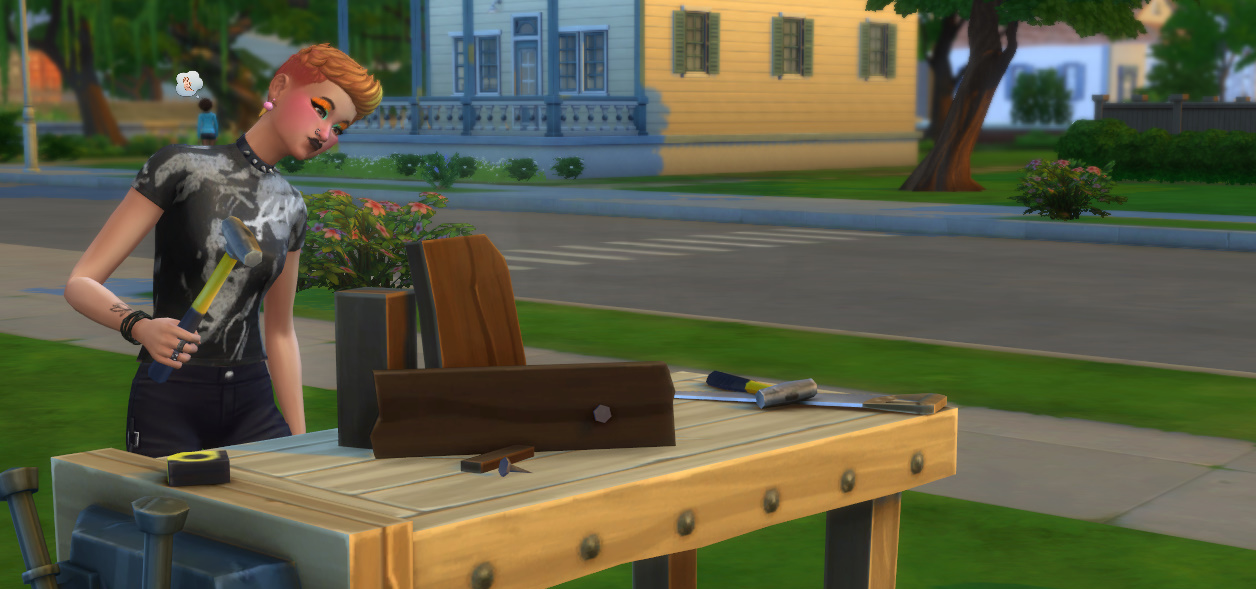Last week, Jimbo, the youngest son of the Smith family, redid the entire house. He outfitted the place with cutting-edge designs like animal print carpets and wood panel walls. His reasoning was that it would ultimately up the property value, and give his mom an excellent place to spend her advancing years. Obviously, from his work, he ended up blinded by what turned out to be a vanity project along the way. His sister ended up taking up the housework he was supposed to do, and his mother ended up resenting his help more than appreciating it. It’s tricky, disliking something that someone is doing to help you. On the one hand, they’re putting in time and resources, on the other, she didn’t ask for it.
Jumping forward another 20 years, we’re in 1990. Mrs. Smith is gone. She was moved into hospice care in her nineties and expected not to last a month. Jimbo was left housesitting while Mom was in the home, and all the kids visited frequently knowing they didn’t have long with her. Much to their, and the nurses’ surprise, she lived another five years. She got to meet her first great-grandbaby, spite a doctor she really hated, and see New Coke fail before she died. She went happy, and a little glad she didn’t have to go in her newfangled decorated house.
Of course, her extended and unexpected hospice stay left Jimbo in charge of the house long-term. What was supposed to be a month or two, turned into five years, and by the end of it he was thinking of the place as his own. When his siblings asked what he was going to do now that Mom was gone, he shrugged them off. In his assumption that things would remain the same, he missed them side-eyeing one another.
See, their mother knew from Jimbo’s big talk during the renovations that he intended to sell the house once she went. It was big, and old, and he thought of it more as property value than a family home. None of the kids really felt attached to the place, since their childhoods were right in the middle of the Great Depression and held a lot of baggage. But all the same, Mrs. Smith didn’t like the idea of it selling. In the last five years, of course, Jimbo had moved in and gotten comfortable, but he hadn’t told his mom he liked the idea of keeping it, he just assumed it would be left to him. It was he who did all the work on it, after all.
Of course, his siblings knew better, and neither of them were surprised when the place was instead left to the daughter. From Jimbo’s perspective, he’d done all the work. But from Mrs. Smith’s perspective, it was her daughter who did the dishes, and the laundry, filled her medication bottles, and bought her groceries. Jimbo was too busy upgrading his assumed inheritance.
The daughter will need a name since she’s about to come up frequently for a stint. Let’s go with…Betty. I keep forgetting that these people are baby boomers in their 70s. It was just weeks ago when they were nameless little kids living in poverty. Ah, time does fly.
So, Jimbo’s living in the house, and it’s been left to Betty instead. This quickly becomes a legal disaster. Betty doesn’t want to force her brother out of the house, but his attitude is quickly becoming so bad about it she minds less and less. To make matters more complicated, Betty never mentioned to her mom that she too intended to sell the place, and Jimbo insists that Betty kept that truth from her intentionally to get the house. Both of them half-heartedly attempt to lawyer up, but Jimbo still isn’t leaving. He renovated it, he’s been living in it, and in his eyes, it’s his.
Even worse, Betty isn’t in the best of health, and neither is their oldest brother…uh…Jim…No wait, Jim and Jimbo doesn’t work, okay, uh…Jera…moot. Jeramoot. That’s a name, sure. Jeramoot, Betty and Jimbo. This is fine.
Anyway, ahem, Jeramoot has been intaking asbestos worksite fumes and tobacco for the better part of four decades, and he isn’t doing so well, slowing down the process. Betty was willing to fight about it, but Jimbo’s been living in the house for over seven years by the time she gets around to it, and it needs a lot of work. He’s been smoking inside, he’s got a few cats to keep him company, and he’s generally turned the place into a cesspit.
The fighting turns into quiet resentment that no one really brings up anymore. Jimbo lives quietly in a house that isn’t his, and Betty is too tired to care. Sometimes a grandchild who doesn’t know better will place an ill-timed question tangentially connected to the situation, leading to more side-eying over a holiday dinner, but that’s about it. Ah, family.
Jimbo’s plan to sell the place completely fled his mind with all the legal issues and fighting. In fact, if asked today he’d insist he always intended to live out the rest of his life in his ‘childhood home’. Jimbo started with good intentions, but has gotten bitter and often spitful as time has gone on. Likely, his mom made all this worse when she was alive by constantly pointing out how he could be more like his siblings. Jeramoot had the family business and Betty had the grandchildren. He’s attached his self-esteem to owning this house, which is toxic and sad. Everyone could have done better, and now there’s an inch of cigarette tar on every interior wall of the building. Sad.

Eesh. What a cheery Sims build. You can almost smell it.
Autoblography

The story of me. If you're looking for a picture of what it was like growing up in the seventies, then this is for you.
The Best of 2019

I called 2019 "The Year of corporate Dystopia". Here is a list of the games I thought were interesting or worth talking about that year.
Quakecon Keynote 2013 Annotated

An interesting but technically dense talk about gaming technology. I translate it for the non-coders.
Linux vs. Windows

Finally, the age-old debate has been settled.
What is Piracy?

It seems like a simple question, but it turns out everyone has a different idea of right and wrong in the digital world.
 T w e n t y S i d e d
T w e n t y S i d e d

My wife came very close to living out this installment. I can smell it as well, having been in that house (or one so similar as to be the same). Great writing.
“These people are baby boomers in their 70s” aren’t they actually the greatest generation? Their children are the baby boomers.
I know Jimbo’s been a jackass, but I pity and sympathize with him. He’s a millennial in a “greatest generation”‘s body.
He didn’t get the family job because he wasn’t the oldest. He didn’t find someone to love and have children with. This looks like his search for jobs in his youth in the great depression didn’t pan out, he somehow didn’t get drafted into WW2 so no military perks, which led to a weak resume that no one wanted to hire (been there) and has been in the shadow of his siblings his whole life. It is not anyone’s fault particularly, but it must’ve been a miserable existence where the only reason he didn’t become homeless was out of family pity, which only made his inferiority complex even worse.
His mother passed peacefully and he will die a miserable self-loathing old man.
Oops. Yup, these are greatest gen. The original parent couple was the silent generation, I think? Generations are tricky since they don’t technically exist and pretty much anyone trying to draw a DEFINITIVE line in the sand is trying to sell or advertise something. Then again, nothing exists without little humans giving things names and categories, lifes pretty great like that. I’m either a millennial or a gen Z depending on who you talk to since the cut-off can be anywhere from 1992-2001.
Distracted rambling aside I defiantly got it wrong either way, I wasn’t just five or six years off, I was a good 20-40, oops.
No, Silent Generation is the cohort AFTER Greatest, not before. The most common label for the cohort that preceded them is the “Lost Generation” – those who were young adults during World War I.
Hope this doesn’t come across as a jerk correction but it’s Definitely not Defiantly. Definitely means for definite or for certain. Defiantly means in defiance to opposition or “strong willed”
RCN’s got a point about these 2nd generation Smiths – they were born before and during the Great Depression, which puts them well outside “Baby Boomer” territory, as the defining historical feature of that generation was being born after WWII.
That said, they might not all qualify as “Greatest Generation,” either, depending on how many years separate them, and just how old they each were when Black Thursday hit. The generally accepted cut-off for inclusion in the Greatest Generation is a birth year prior to 1925. Jeramoot would’ve been born (presumably) somewhere between 1913 (when his parents got married) and, on the outside, 1916 (we’re almost half a century before the development of oral contraceptives. Married couples without a medical impediment seldom remained childless for more than a year or 2). That leaves the Smiths with roughly a decade to add Jimbo and Betty to the family and still have all 3 fall inside that generational cohort. On the other hand, the harsh realities of limited obstetric and pediatric medicine in the early 20th century do also mean that events such as miscarriages and infant mortality were dramatically more common as well – just because the Smiths had 3 children who reached adulthood doesn’t mean Mrs. Smith was pregnant only 3 times, or even that she gave birth to just 3 children. Add in the vicissitudes of modern life and the general absence of public awareness of family planning of any kind, and it isn’t hard to imagine a scenario where Jeramoot is born right there under the roof of a still-new 1605 Cottonview Lane (home births still being a fairly common thing at the time, especially outside of major cities) in late 1915. (It’s a story the elder Smiths never liked to talk about much, because it very much wasn’t a smooth delivery – Mrs. Smith’s father being quite suspicious of all this new-fangled “medicine” talk and simply refusing to pay some quack “doctor” to preside over the birth of his first grandson. Unfortunately, Mrs. Smith went into labor during an especially nasty storm, and the more experienced local midwife was simply not up to the journey in such bad weather. Her protégé didn’t do anything wrong exactly, but she wasn’t as swift to recognize the signs of trouble as her mentor would’ve been, and then slower to address the issue when it became obvious, so while both mother and baby ultimately survived, Mrs. Smith took rather longer to recover fully than one might expect, and Mr. Smith was even longer getting past his fears of a repetition.)
Times being what they were, little Jeramoot was nearly 5 before Jimbo came along in 1920. Fortunately this time things went smoothly – Mr. Smith insisted a real doctor attend this time, and his father-in-law was spooked enough by his daughter’s near-miss that he agreed to do without Mr. Smith for a bit so his 2nd grandchild could be delivered in an actual hospital – the whole young family took the train into The City for 2 weeks, and Betty was born after they’d been there 6 days.
Still, that wasn’t the end of the Smiths’ pregnancy-related misfortunes. Though Mrs. Smith recovered much more quickly following Jimbo’s delivery, she also wasn’t getting any younger (assuming she was somewhere around 20 when she married Mr. Smith, she’d have been roughly 27 when her 2nd child arrived). Baby Betty wasn’t yet out of nappies when her mother caught again, but it was not to be – one of those basement-ladder accidents mentioned earlier resulted in a tragic miscarriage late in the first trimester. Nothing so obvious could be blamed, 3 years later, when Mrs. Smith (now 31) was again with child only to be struck by an inexplicable wave of terrible cramping pains late at night. She hadn’t even dared tell Mr. Smith she was pregnant yet, and went to her grave never speaking about it to anyone.
And so, little Jimbo didn’t come along until 1927, placing him as a member of the “Silent Generation,” when his siblings are 12 and 7, respectively.
As a bonus, this timeline explains why the tumult of World War II passed the Smiths by without either son enlisting – Jeramoot would’ve been 26 on Pearl Harbor day in 1941, and likely a vital part of Mr. Smith’s developing construction company. Betty, at 21, may well have gone to work on an assembly line (“We Can Do It!”) while her male peers entered boot camp, but Jimbo, little baby of the family, was only 14. And by the time Imperial Japan finally surrendered 4 years later, poor, overshadowed Jimbo had turned 18 just in time for there to be no war left to fight. So rather than getting to go off and become a hero, he’s stuck having to go to work for Pop Smith – except really he’s mostly doing whatever Jeramoot tells him to do, and what kid brother in all of history has taken orders from his older brother with grace? Doubtless this attitude does him no favors in his social life – bad enough he can’t compete with all those returning GIs for dates, but a relentless air of sullenness is seldom attractive to potential romantic partners (which illuminates the foundation of where Jimbo’s status as a lifelong bachelor was laid, as well).
Wait, I’m confused. In one place, you say that:
But then you say:
.
Unless by “kids in the Great Depression” you mean the brothers and sisters of Mrs. Smith? Because the previous sentence is talking about Jimbo and the kids. So I assume you mean Jimbo’s brothers and sisters?
Other than that – I’m really liking this series :)
“It was just weeks ago when they were nameless little kids living in poverty.”
I like the idea that the family was so poor they couldn’t afford to give their children names.
“This is the first one, that lass is the second one and this baby in my arm is the weird one.”
Can see that happening in the depression. Since worse happened.
“This is the first one, that lass is the second one and this baby in my arm is the weird one.”
Can see that happening in the depression. Since worse happened.
Man. This episode was a downer. Really well-written, but a downer.
Yup, no question, you can feel the people in the house.
1990 is “only” 33 years ago. We’re getting into the times when people you know were alive (me too.)
Ah! You raised my hopes… and then down they go. So Jimbo more-or-less steals the place, then ruins it. What’s funny is that even if the next owner appreciated (or at least didn’t mind) his taste in carpet and wallpaper and so forth, he’s now managed to destroy all of it with his smoking. Sad, indeed.
How would this work, with lawyers involved, in the real world? If the house was left to Betty I assume legally it’s hers, regardless of Jimbo’s feelings.
The house is legally hers, no question. Squatters’ rights could possibly protect him in ten to twenty years of residency. But, at the time of the inheritance he didn’t have that. The thing is, because he wouldn’t leave the place of his own volition, it would have required getting the police involved. The idea here is that Betty procrastinated because she didn’t want to make a scene. Police involvement would be messy, socially and family-wise.
Whether it’s fair or not, her kicking him out would have social consequences. Jimbo brags about helping redo the place. He talks to people constantly about everything he did for his mom, it’s his point of pride. To people that knew both siblings, it would come off as cruel for her to kick her brother out of his home after their mother died. She could argue it, but people make their own opinions, and he’s far more defensive and likely to talk about it to defend himself since he’s in the wrong. She could have an old, leaky, smoke-filled house if she wanted, it’s hers, but it could cost her many of her friends and some of her family in the process.
Interesting to think how things would go these days with the involvement of social media and people’s quickness to take a side.
The whole “taking sides” thing really draws attention to the fact that people still aren’t that much different now than they were then. As yes, that’s what people would do. And it would still have negative consequences for everyone involved (if different ones or less severe ones for certain parties).
Instead of the very logical course of action that would have been “We both want to sell this place this home we grew up in that our parents built. We should do that and split the money.”
Bay did a good job of setting up the story of this family in a way where everyone’s (including Mrs. Smith’s) bad decisions resulted in this unfortunate situation.